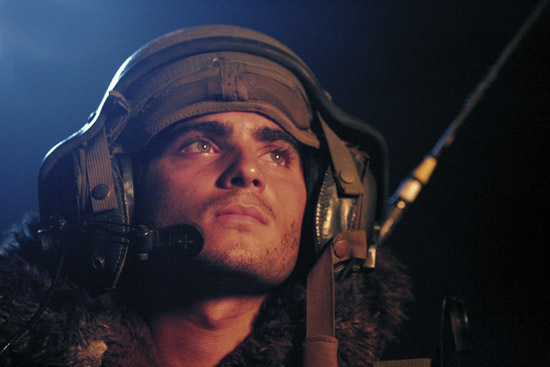

Reviews of Recent Independent, Foreign, & Documentary Films in Theaters and DVD/Home Video
Directed by Joseph Cedar Written by Cedar & Ron Leshem, based on the novel by Leshem Produced by David Silber & David Mandil Director of Photography, Ofer Inov Edited by Zohar M. Sela Music by Ishai Adar Released by Kino International Language: Hebrew with English subtitles Israel. 125 min. Not Rated With Oshri Cohen, Itay Tiran, Eli Eltonyo, Ohad Knoller, Itay Turgeman & Arthur Faradjev
This isn’t Vietnam or Iraq. Beaufort is the “beautiful fortress” (known as Shqif Arnun, “High Rock” in Arabic) that has been strategically and symbolically overlooking centuries of failed policies along the scenic road to Damascus. Originally a Roman encampment, it was built up by the Crusaders in the 12th century, expanded by Muslims in the 13th century, controlled by the PLO during the 1970s civil war in Lebanon, and then captured by the Israeli army in 1982 as they invaded the southern part of the country. Beaufort is set in 2000 as protesting Israeli citizens and Hezbollah fighters pressure the army to retreat. Bomb expert Ziv Farran (Ohad Knoller, The Bubble’s hunk) arrives by helicopter amidst repetitive announcements of mortar alerts. The hand-held camera follows him into the fortress through the dark, endless, confusing sandbagged tunnels to a confrontation with determined Sergeant Liberti (Oshri Cohen), to whom he insists that the mined road is too dangerous to navigate. But with the enemy also launching increasingly accurate blasts, no supplies are coming in, and no men are getting out until the road is cleared. Tension mounts as personalities clash while the men wait for orders from higher-ups on how to proceed. Visually telling much of the story, Ofer Inov’s striking cinematography captures the smoke-filled redoubts, truck convoys maneuvering in the dark, and the mountain sunrises and sunsets. The intense waiting highlights the differences among the band of brothers who are intimately restricted to an area as claustrophobic as a World War I-set trench or a World War II submarine. (In the English translation of journalist Ron Leshem’s novel, the living quarters are, in fact, nicknamed “the submarine” by the soldiers). While some of their ethnic, class, geographic, and religious differences are not as clear to non-Israelis as in Cedar’s earlier films dealing with societal stress lines (Time of Favor and Campfire), the soldiers bond around the usual teasing and earthy diversions of young men committed to die for each other. In a war that’s ironically just a short flight from home, Oshri (Eli Eltonyo) counts the days until his tour of duty is over, with a small U.S. flag reminding him of his girlfriend waiting in New Jersey. But Ziv volunteered for the mission because his uncle was killed taking the mountain, though his father, active in peace groups, demands withdrawal. All are too aware that their split-second decisions are also being watched and argued about at home, as they can see from the Israeli newscasts – that’s how they learn the Cabinet has set the date for their evacuation. While casualties mount as they wait and wait for new orders they are not sure they want to follow, they frankly debate if they are nothing more than just cannon fodder.
Like a diary, the novel is made up of Sergeant Liberti’s vivid first-person impressions over several years. Here, he is an enigma gradually unwrapped
to be the film’s emotional center, a powerful portrait of an officer facing up to what it means to serve in an army of a fallible, democratic country
that spins an explosive pyrrhic victory. As Norman Thomas said about soldiers in another disputed war, these pawns bleed.
Nora Lee Mandel
|